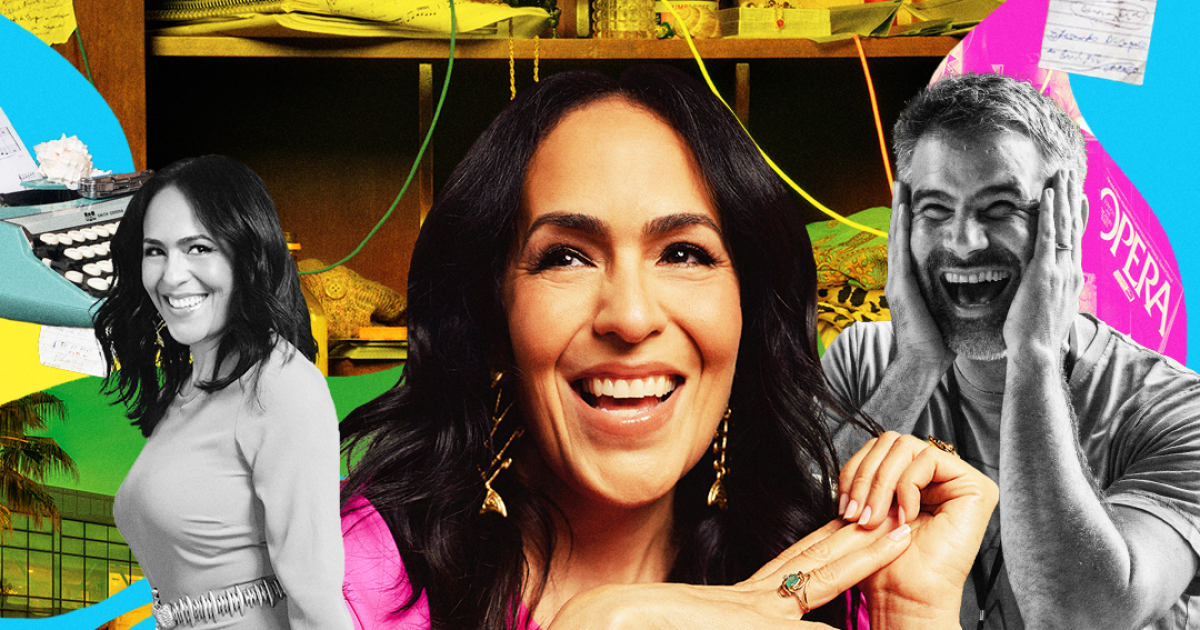The Latina actor-writer, greatest recognized for her position in Nickelodeon’s “Los Casagrandes,” meets grief with comedy in her one-woman present, which particulars the method of caring for her growing older mom with Alzheimer’s illness.
How does one care for his or her growing older mum or dad with out shedding sight of their very own id?
The very first thing Roxana Ortega will say is: “We now have to not abandon ourselves.”
The L.A.-born Latina actress outlines the deeply emotional strategy of caring for an growing older mum or dad in her first play, “Am I Roxie?,” which premieres Sept. 11 and kicks off the Geffen Playhouse’s 2025-26 season.
The manufacturing will stay by Oct. 5 on the Gil Cates Theater and is directed by Bernardo Cubría, (“Crabs in a Bucket” and “The Play You Need”).
Ortega’s one-woman present was impressed by her mom, Carmen, whose reminiscence is in decline attributable to Alzheimer’s illness. Bounded by her dedication to being the proper Latina daughter, Ortega illustrates how she stepped as much as present caregiving duties, whereas attempting to maintain her performing profession — even when it was only a Jimmy Dean breakfast sandwich industrial.
“This present to me is about tips on how to not abandon ourselves in a time of such nice darkness,” says Ortega by a video name.
Onstage, Ortega masterfully transforms her solo act into an ensemble efficiency, by her many quirky accents and mannerisms alone; her characters vary from her three Peruvian tías to an imaginary cholo critic and a perky, silicone-bloated nurse.
Capturing a broad emotional spectrum, from pleasure to grief, it’s clear that Ortega — a former troupe member of the Groundlings Sunday Firm — showcases a lifetime of expertise on the Westwood stage.
“All the things simply merged as I used to be attempting to jot down about what was taking place,” says Ortega. “I used to be additionally leaving sketch comedy [group] the Groundlings, so I used to be discovering my very own voice. All these issues merged to start this, an ideal mixture of so many wishes and desires I’ve had.”
With over 80 performing credit to her identify, the multi-hyphenate artist is greatest recognized for voicing the melodramatic Frida Casagrande from Nickelodeon’s Emmy-winning present “The Casagrandes,” an animated sitcom a couple of household dwelling within the fictional Nice Lakes Metropolis. Different notable credit embrace Netflix’s “Grand-Daddy Day Care” and “Santa Clarita Weight-reduction plan,” Warner Bros.‘ “Miss Congeniality 2” in addition to the favored Fox collection “New Woman.”
Audiences ought to buckle up — ideally with tissues on the prepared — for a curler coaster of feelings, as they witness Ortega relinquish management over an unchangeable destiny, whereas holding compassion for her mom and herself in “Am I Roxie?”
This interview has been edited and condensed for readability.
Your one-woman present, “Am I Roxie?,” explores your private journey as a caretaker on your growing older mum or dad, nevertheless it additionally focuses in your inventive aspirations. Are you able to stroll me by your determination to make this the topic of your subsequent undertaking?
I’ve at all times wished to show my private materials into artwork; most artists do really feel that method. I had been doing it for fairly some time in sketch comedy, [by] taking characters like my tías, who I discover to be so hysterical, and attempting to place them into issues. So I knew someplace at the back of my mind — or within the center — that I wished to do a present about my household. I watched Ruben Santiago-Hudson’s “Lackawanna Blues,” so I at all times wished to do this.
This play approaches heavy subjects with humor. How did you strike that steadiness?
I feel that’s simply the way in which my mind works. I feel quite a lot of comedians are this fashion; we’re at all times searching for laughs and perhaps that’s how we survive ’trigger we’re very delicate individuals — I’m very delicate and really intense, so laughter is that levity.
By the event course of, we did have some discussions about sure moments. Do we would like individuals to giggle after I’m within the chaise longue texting, “Is [my mom] nonetheless alive?” We had extra “Shark Tank” sounds working by that after which modified it.
Caregiving is clearly an enormous endeavor for Latinos — Latina girls, extra particularly. How do you make sense of the thought of care now?
I [think of] abandonment. There’s one thing so primal when any individual is growing older and you may inform, “This particular person was accountable for me; they’re so weak; now they want me. Oh my god, I can’t abandon them, proper?” You are feeling like, “I don’t wish to be deserted, so I don’t wish to abandon them.” It actually shocked me how robust that urge was and I feel we additionally must not abandon ourselves. We completely can not.
For those who go into the caregiving world, they speak about care like: “Right here’s your tablets, right here’s the meals and we have now some music coming in.” Perhaps in the event you’re fortunate, there’s bingo — however my mother wouldn’t play bingo! Are you f— kidding me? Care needs to be individualized. It ought to tackle the spirit.
Guilt creeps up on this play disguised as your internal Latina critic each time you do one thing that feels egocentric in gentle of your mother’s state of affairs. What relationship do you might have along with your internal critic now?
I undoubtedly really feel like I’ve gone by a journey from concern to like with the duty of caregiving and even in relation to myself; I discovered to like myself extra, which is a part of caring for your self.
On this strategy of placing [my story] on the market, of simply being so light with myself and saying, “It doesn’t matter what occurs, regardless of the way it’s obtained, I’m not going to place my id on the road.” There shall be no beating myself up. There shall be no, “Now you’re horrible as a result of this, this, this …” It’s at all times a follow. Life is just too quick for us to really feel unhealthy.
There’s no profit to struggling, and most of our struggling we do to ourselves by that critic by giving it energy. And in our tradition, generally it’s glorified.
You’re an overachiever, a Berkeley grad and former Groundlings member. However in “Am I Roxie?,” you steadiness the urgency of reaching your targets with the grief of shedding a mum or dad who remains to be alive. How did it really feel to not hand over in your desires?
I felt like a horrible daughter. It’s exhausting. There’s a degree within the present after I go away my mother and he or she says, “Don’t go away me right here,” and I go away her and go to an audition. That’s a tough second and I can inform that the viewers is like, “How may you do this?” It feels weak to indicate that I did that. However then, how does a mom go away their youngster at kindergarten? How are you going to discover the steadiness the place you’re nurturing your self and nurturing any individual else?
It was exhausting. I might beat myself up quite a bit and cry about feeling so horrible. After which go the subsequent day to absolve myself. The extra [my mom] discovered different relationships with a caregiver, the extra I felt like, “Okay, she’s protected.”
Motherhood can be on the core of your story — not simply along with your mom, however as you discover your personal fertility journey. How did your idea of motherhood change after caring on your mom?
What I didn’t explicitly say within the play is that I’m a mom. I mothered my mom. Now, not everybody who’s a mom by having a child is essentially a “mothering mom.” One thing that this illness taught me is what these phrases actually imply. What’s it to be a sister? What’s it to be a mom? What I discovered in caring for my mother is that I’m a mom, as a result of I used to be capable of nurture on such a deep stage. Even when all of the indicators confirmed that she’s not there anymore. A mom is aware of her child. She was my child on the finish.
After our fertility journey, 10 years of attempting, me birthing this piece of artwork was me mothering my creativity into existence.
You don’t point out Alzheimer’s by identify till that very finish. Why?
A part of it was accepting the journey and having the ability to say the prognosis. Generally there’s an avoidance round Alzheimer’s. No person desires to say the phrase or discuss concerning the illness ’trigger it’s unhappy. So I wished to make it a second after I truly mentioned it in order that we are able to see the burden of it. Hopefully viewers will go away the theater having the ability to discuss it and to comprehend it in an intimate method. Naming it’s so vital, so we are able to take the sting and discomfort off.
There are tender moments onstage the place you set free tears. What’s it prefer to relive these real-life moments on stage each evening?
It’s so troublesome, harder than I assumed it will be. My mother is onstage with me after I stroll on the market. I take her hand and I put her in that little opera chair subsequent to me and we’re collectively. Saying goodbye to her each evening is difficult.

